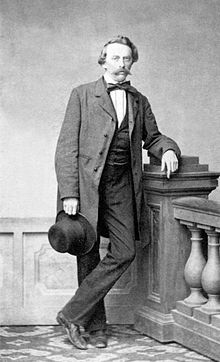Moritz Wiggers
Moritz Wiggers (born October 17, 1816 in Rostock ; † July 30, 1894 there ; full name: Moritz Carl Georg Wiggers ) was a German lawyer and politician.
Life
Moritz Wiggers was the younger son of the theologian, university professor and rector of the University of Rostock , Gustav Friedrich Wiggers . Wiggers studied law and political science at the Ruprecht-Karls-Universität Heidelberg and the Georg-August-Universität Göttingen . From October 1835 he studied philosophy at the University of Rostock. He joined the Corps Vandalia Rostock (1836), Hanseatia Rostock (1837) and the Guestphalia Heidelberg (1837). After graduating, he settled in his hometown as a lawyer and notary in 1843 .
Politically interested and committed since his studies, he soon became one of the leading members of the Rostock Democratic Press Association . The German Revolution of 1848/1849 brought about the fact that Wiggers was elected President of the constituent Mecklenburg Parliament on November 3, 1848 . It was the first democratically elected parliament in the history of Mecklenburg , with which the state part of Mecklenburg-Schwerin became a modern constitutional state for two years. Wiggers represented the constituency of Mecklenburg-Schwerin 10.
When the revolutionary Carl Schurz freed the theologian Gottfried Kinkel from the prison in Spandau near Berlin in a sensational action on the night of November 7th, 1850 and both fled to England via Warnemünde with the support of the Mecklenburg democrats , Wiggers was one of the leading escape helpers. He was later accused of being an accomplice, but acquitted of all charges.
Wiggers, who was thus finally on the blacklist of the reaction, was embroiled in the Rostock high treason trial with his brother Julius Wiggers in 1853 . Because of these allegations, Wiggers was in custody in prison between May 1, 1853 and January 9, 1857 . The trial ended with a three-year sentence, which he served in the Dreibergen State Penitentiary. Grand Duke Friedrich Franz II pardoned him with effect from October 24, 1857; to return to his profession, but was denied him for life. Wiggers therefore, like his brother Julius Wiggers, settled in Rostock as a writer . During this time he was also involved in the founding of the Central Association for the Elevation of German River and Canal Shipping . The German National Association found an eager employee and advisor in Wiggers.
In the Reichstag (North German Confederation) and - from the Reichstag election in 1871 to the Reichstag election in 1881 - in the Reichstag (German Empire) , Wiggers represented the German Progressive Party . He was elected in 1867 in the constituency of Berlin 3, from 1871 in the constituency of the Grand Duchy of Mecklenburg-Schwerin 3 (Parchim-Ludwigslust).
See also
- Revolution in Mecklenburg (1848)
- List of members of the Mecklenburg Assembly of Representatives
- List of Corps students in the Reichstag of the North German Confederation and in the Customs Parliament
- List of corps students in the Reichstag of the German Empire
- List of members of the Reichstag of the German Empire
Works (selection)
- [With Julius Wiggers :] History of the three Mecklenburg regional monasteries Dobbertin, Malchow and Ribnitz. Rostock, 1848
- The Mecklenburg tax reform. 1861
- Two lectures about the agricultural conditions in Mecklenburg-Schwerin. Leipzig, 1861
- Prussia and the Zollverein. 1862
- The extermination struggle against the farmers in Mecklenburg. On the history of junky in Germany and on understanding its politics. Leipzig, 1864
- The financial situation of the Grand Duchy of Mecklenburg-Schwerin. 1866
Individual evidence
- ↑ Registration of Wiggers in the Rostock matriculation portal
- ↑ Kösener Korpslisten 1910, 185 , 439; 182 , 2; 112 , 420
- ↑ Not on October 31, as it is erroneously stated in the literature. The presidential election did not take place until the fourth session of the state parliament on November 3, 1848. Wiggers prevailed against Carl Trotsche with 57 against 42 votes . - See report on the negotiations of the constituent Mecklenburg Landtag. Leaves for free folk culture. Neustrelitz (1848), 20 (November 12), p. 161 f.
- ↑ Bernd Haunfelder , Klaus Erich Pollmann : Reichstag of the North German Confederation 1867-1870. Historical photographs and biographical handbook (= photo documents on the history of parliamentarism and political parties. Volume 2). Droste, Düsseldorf 1989, ISBN 3-7700-5151-3 , photo p. 358, short biography p. 488.
- ^ Fritz Specht, Paul Schwabe: The Reichstag elections from 1867 to 1903. Statistics of the Reichstag elections together with the programs of the parties and a list of the elected representatives . 2nd Edition. Carl Heymanns Verlag , Berlin 1904, p. 269
- ^ Digitized copy of the copy in the Bavarian State Library
- ^ Digitized copy of the copy in the Bavarian State Library
- ↑ digitized version
literature
- Heinrich Klenz : Wiggers, Moritz . In: Allgemeine Deutsche Biographie (ADB). Volume 42, Duncker & Humblot, Leipzig 1897, pp. 465-468.
Web links
- Literature about Moritz Wiggers in the state bibliography MV
- Moritz Wiggers in the database of members of the Reichstag
| personal data | |
|---|---|
| SURNAME | Wiggers, Moritz |
| ALTERNATIVE NAMES | Wiggers, Moritz Carl Georg (full name) |
| BRIEF DESCRIPTION | German lawyer and politician (DFP), MdR |
| DATE OF BIRTH | October 17, 1816 |
| PLACE OF BIRTH | Rostock |
| DATE OF DEATH | July 30, 1894 |
| Place of death | Rostock |
